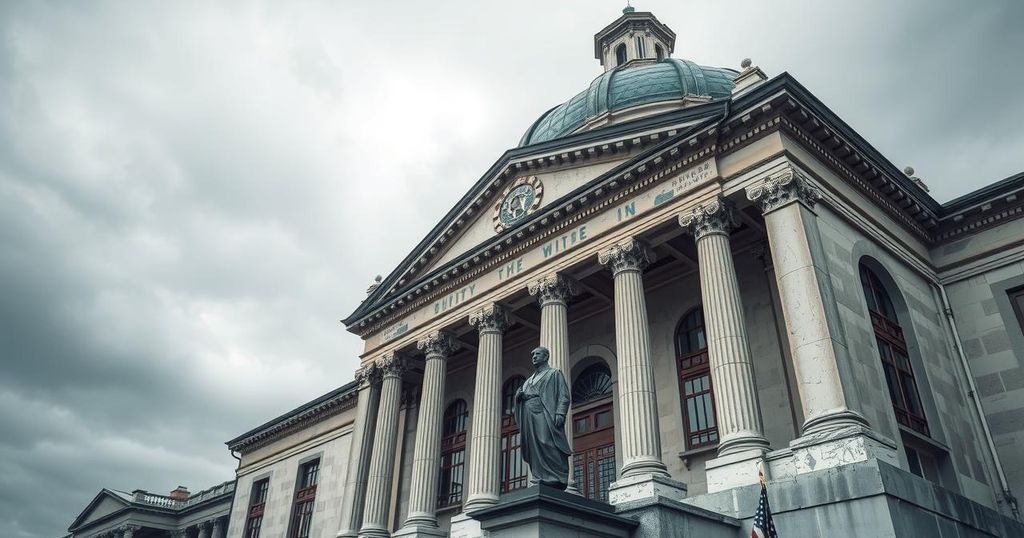Cameroon is set for elections in 2025, likely featuring 91-year-old President Paul Biya seeking an eighth consecutive term. Despite health concerns, political commentators anticipate his candidacy. His lengthy rule has seen mixed reactions, compounded by civil unrest and economic issues. The opposition remains divided and struggles to present alternatives, raising questions about the future of governance in Cameroon.
As Cameroon approaches its 2025 elections, 91-year-old President Paul Biya stands poised to seek an eighth consecutive term, potentially extending his reign to 42 years.
Dr. John Akpo, a political analyst, confirms that Biya’s party members have proposed support for his candidacy despite concerns regarding his health. Elvis Ngolle Ngolle of the Cameroon People’s Democratic Movement (CPDM) indicated preparations are underway, but he refrained from confirming Biya’s intentions.
If re-elected, Biya would be 99 years old by the next election cycle in 2032. His leadership has garnered mixed reactions, with Akpo questioning the authenticity of support from some opposition parties, suggesting they are mere extensions of the ruling party.
Biya has introduced multi-party democracy in Cameroon, yet ongoing civil unrest, particularly from Anglophone separatists, has hurt the economy. Opposition lawyer Tamfu Richard argued that Biya’s advanced age may hinder effective governance, citing his inability to engage with conflict zones due to health limitations.
Critics claim Biya has suppressed political dissent, citing the imprisonment of peaceful protesters, including opposition leader Maurice Kamto, who faced significant jail time under ambiguous circumstances.
The ruling CPDM party relies on coalition support from other parties like the MDR and UPC to maintain parliamentary control. However, both coalition partners have experienced waning public support, raising questions about the stability of Biya’s government.
Recently, Cameroonian Catholic bishops have reportedly addressed the political climate, calling for improvements in citizens’ living conditions without demanding Biya’s resignation. Some observers suggest the bishops could influence public opinion due to the Church’s significant role in Cameroonian society.
Economically, Cameroon has shown slight recovery signs but faces challenges such as inflation and internal strife. The World Bank reports that GDP growth decreased in 2023 but recovered slightly in early 2024, driven by improvements in key sectors.
Despite the economic struggles, poverty reduction has stalled, with approximately 23% living below the extreme poverty line. Critics like Akpo lament rampant corruption, claiming it severely impacts state affairs and citizen welfare.
With structural challenges, including poor infrastructure and dependency on commodities, experts affirm that these issues demand urgent attention. However, doubts linger about whether Biya’s potential continued presidency could address these effectively.
Lastly, the opposition has struggled with infighting, failing to propose credible alternatives to Biya’s leadership. Michele Ndoki, a supporter of opposition efforts, mused on public sentiment favoring the status quo despite questioning Biya’s capability to govern due to his age.
The upcoming elections in Cameroon present a critical juncture for the nation’s leadership, primarily revolving around Paul Biya’s potential candidacy for another term. At 91 years old, his continued rule has raised significant concerns regarding governance capacity and the country’s political stability. The opposition has faced challenges in unifying against the ruling CPDM, creating an environment where Biya’s reign appears unchallenged despite prevailing national unrest and economic difficulties. There is also an ongoing civil conflict that has arisen, deeply impacting not just the political landscape but also Cameroon’s economic health. The dynamics among various political factions, including supposed opposition parties linked to Biya’s government, further complicate prospects for change in leadership. In addition, the Catholic Church’s influence positions it as a potential mediator for public sentiment and political stability.
In conclusion, the political landscape of Cameroon is poised for another possible term under President Paul Biya, despite his advanced age and health concerns. The ruling party’s grip on power remains strong, bolstered by controversial coalitions and a fragmented opposition lacking credible alternatives. Social unrest, economic challenges, and calls for political reform underscore a nation in need of governance that addresses the welfare of its citizens. As Cameroon heads toward these elections, the validity and effectiveness of Biya’s leadership are subjects of national concern.
Original Source: www.dw.com






